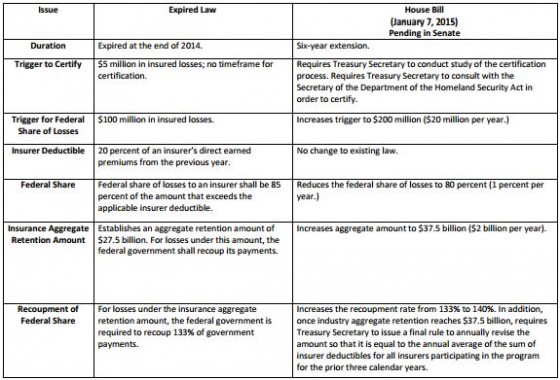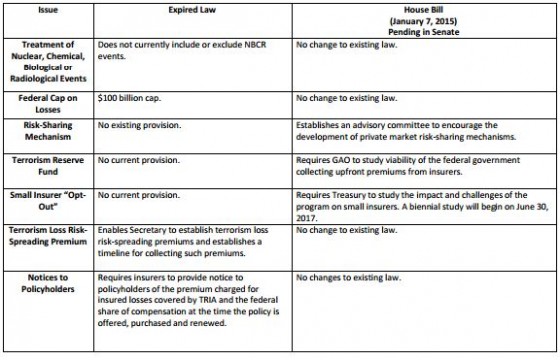The insurance industry breathed a sigh of relief this week after President Obama signed legislation reauthorizing the Terrorism Risk Insurance Act (TRIA), which had been allowed to expire on Dec. 31, 2014.
The Terrorism Risk Reauthorization Act of 2015, H.R. 26, was passed by the House on Jan. 7 by a vote of 416 to 5 and the Senate, 93 to 4.“After several years of delivering testimony, lobbying and developing initiatives that allow RIMS members to voice their concerns regarding TRIA’s expiration, our hard work was finally rewarded,” said Rick Roberts, 2015 president of RIMS. “We are thrilled that Congress and President Barack Obama finally realized that this federal backstop is more than just an insurance issue. TRIA offers all organizations that do business in the U.S. financial protections to cope with the very real and unsettling devastation caused by terrorism, as well as the confidence to remain focused on their objectives.”
“A well-functioning private terrorism insurance marketplace has been preserved because Congress and the Administration made TRIA’s reauthorization an immediate priority,” said Leigh Ann Pusey, president and chief executive officer of the American Insurance Association (AIA). “The program, which has overwhelming bipartisan support, will continue to protect our nation’s economy against major acts of terrorism. AIA thanks Congressional leadership and the Administration for moving so quickly to reauthorize TRIA.”
TRIA was first signed into law in 2002 by President George W. Bush. It was later extended as the Terrorism Risk Insurance Extension Act of 2005 and in 2007 the president signed into law the Terrorism Risk Insurance Program Reauthorization Act of 2007 (TRIPRA). The law, which is administered by the U.S. Department of the Treasury created a “temporary federal program that provides for a transparent system of shared public and private compensation for certain insured losses resulting from a certified act of terror,” according to the Department of Treasury.
The final version reauthorizes the program for six years with the following changes:
An increase from $100 million to $200 million is phased in to the program’s trigger by 2020.
Decreases federal share of losses from 85% to 80% by 2020
Increases the government’s mandatory recoupment amount from $27.5 billion to $37.5 billion by 2020
Increases recoupment percentage amount from 133% to 140%
Streamlines the certification process for an act of terror by removing the Secretary of State and Attorney General from the formal process
Instructs the Secretary of Treasury to issue a certification timeline to Congress
The National Association of Professional Surplus Lines Offices (NAPSLO) said it continues to gather information on the impact of TRIA’s reauthorization.
NAPSLO issued a side-by-side comparison of the expired TRIA program and H.R. 26:





 />i
/>i